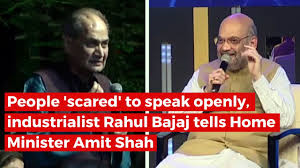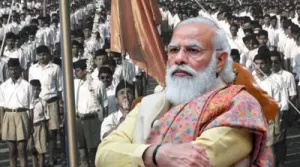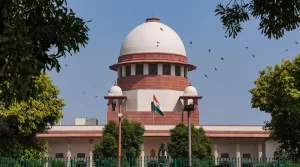Courtesy: The Wire Staff
Bajaj Group chairman Rahul Bajaj on Saturday, November 30, raised concerns over the ability of the Narendra Modi government to accept criticism, its lack of action against mob lynchings and BJP MP Pragya Thakur’s recent remarks on Nathuram Godse to a crowded room of India Inc elite and top ministers including Amit Shah, Nirmala Sitharaman and Piyush Goyal.
“Nobody from our industrialist friends will speak, I will say openly… An environment will have to be created… When UPA II was in power, we could criticise anyone… You (the government) are doing good work, but despite that we don’t have the confidence that you will appreciate if we criticise you openly,” the Bajaj Group chairman said at an awards event organised by the Economic Times in Mumbai.
“Today anybody can be called a patriot, you know the man who shot Gandhiji, or is there any doubt about that, I don’t know. This was said earlier, you gave the ticket, she won, that’s all right, she won because of your support, no one knew her. Gave her a ticket, then you brought her into the consultative committee. The Prime Minister had said that it would be difficult for him to forgive her, still you brought her into the consultative committee etc. etc. All right, she was removed, and for this session, this small session, she won’t have the permission to attend. This is one example,” the industrialist said.
The Union ministers were on stage at this time and fielding questions from some of India’s top industrialists. The audience included businessmen like Reliance boss Mukesh Ambani, Bharti Enterprises chairman Sunil Bharti Mittal and Aditya Birla Group head honcho Kumar Mangalam Birla.
On the issue of lynchings, Bajaj noted that it created a “hawaa” or air of intolerance.
“It creates an environment of intolerance and we are scared. We don’t want to say certain things but we see that until now no one has been convicted.”
Amit Shah’s response
Seeking to rebut Bajaj, the home minister said that there was no need to fear and if there was a certain kind of atmosphere currently prevailing, then “we will have to make an effort to improve the atmosphere”.
Shah also noted that that several media organisations regularly criticise Modi and the current government.
“But even then, if you say that there is a certain kind of atmosphere, we will have to make efforts to improve the atmosphere. But I would like to say that there is no need for anybody to fear… No one wants to scare… and we have done nothing to be concerned about any criticism… The government has run in the most transparent way, and we have no fear of any kind of opposition, and if anyone does criticise, we will look at the merit of the same and make efforts to improve ourselves,” he said.
On the issue of Pragya Thakur, the home minister noted that neither the BJP nor the Centre supported any of her statements on Godse and that they indeed condemned it.
Shah was also quick to add that there may have been some confusion over whether the Bhopal legislator had meant Godse or revolutionary Udham Singh.
On lynchings, Shah noted: “Lynchings happened earlier too, probably more than now… But it is not correct that there have been no convictions. Several cases of lynchings have been concluded and there have been punishments but the media does not publish them. Vineet ji [Vineet Jain, MD of the Times Group] is here, if he looks for them and publishes them, it will be good for us.”
Fact check
How well does Shah’s defence stand up though? The home affairs minister and the industrialist sparred over three issues.
Pragya Thakur and Godse: In May 2019, the Bhopal MP first referred to Godse, the assassin of Mahatma Gandhi, as a “patriot”. At the time, she drew criticism from Prime Minister Narendra Modi who said that he would never be able to forgive his colleague for her remarks.
At the time, Amit Shah gave Thakur over a week to respond to a disciplinary notice. However, it’s unclear what actually came of this and whether Thakur was penalised.
Avinash Rai Khanna—the BJP’s disciplinary committee chair—told The Wire last week that his committee had submitted its report and recommendations to the party president but it was up to him to decide what has to be done. “Our job is only to submit a report”, he said. He confirmed that he had submitted the report a while ago but received no word since. The implication is clear: Amit Shah probably has no intention of taking any disciplinary action.
Apart from not ‘disciplining’ Thakur for her Godse comment, the BJP rewarded Thakur several months later by appointing her as a member of the consultative committee on defence. The appointment was also curious as the MP is facing charges in the Malegaon blast case.
Last week, the Bhopal MP once again referred to Godse as a “patriot” in Parliament, prompting the BJP to remove her from the parliamentary panel and bar her from attending party meetings in the ongoing winter session of Parliament.
While Shah maintains that the party condemns Thakur’s stance on Godse and action has been taken, it is unclear why she was not disciplined the first time around and indeed rewarded for it. With Thakur now repeating the remarks again, it remains to be seen whether a more serious and lasting punishment is handed out.
Atmosphere of fear: The home minister noted that many newspapers and editors continue to write against Modi and the NDA government, a sign which is supposed to indicate that critics of the government of India are not living in an atmosphere of fear.
And yet, there has been a substantial increase in the police booking dissenting activists on serious charges like sedition and National Security Act. The latest such incident of highhandedness was seen when the police filed a sedition case against important personalities like Ramachandra Guha, Mani Ratnam and Aparna Sen, who wrote an open letter to Modi raising concerns over the growing incidents of mob lynching. The case was later withdrawn as public pressure built up.
In Manipur, a television journalist, Kishorechandra Wangkhem, was jailed for several weeks under the draconian National Security Act for making critical comments about Modi.
Such has been the misuse of sedition law in the current government that the Supreme Court had to caution the police against its abuse as it directed them to follow the Kedar Nath judgment which said that criticism of the government is not seditious.
The case in which prominent rights activists—Sudha Bhardwaj, Rona Wilson, Surendra Gadling, Sudhir Dhawale, Mahesh Raut, Prof. Shoma Sen, Rona Wilson, Arun Ferreira, writer Varavara Rao and Vernon Gonsalves—were arrested under the stringent Unlawful Activities (Prevention) Act (UAPA) is well known. A year after their arrests, they are struggling to get bail even as the police has failed to produce concrete evidence against them.
Before that Delhi University professor G.N.Saibaba was arrested and sentenced in a similar way. Bhim Army leader Chandrasekhar was also booked under the strong National Security Act (NSA). It took him over a year to get bail.
The media, both mainstream and otherwise, has also struggled. In April 2019, Reporters Without Borders’ press freedom rankings placed India at an abysmal 140 position out of 180 countries. The report found an increase in coordinated hate campaigns on social media networks against journalists who spoke out against communalism. Several international reports have indicted India for failing to curb attacks on journalists. In 2017, the ‘India Freedom Report: Media Freedom and Freedom of Expression in 2017’ said that at least 11 journalists were killed, 46 attacked, 27 cases of police action were initiated against scribes. The Committee to Protect Journalists (CPJ) has placed India for the 12th successive time as the country with the worst records of bringing to book the killers of journalists.
In the last few months, the people of Jammu and Kashmir have also been dealt an unfortunate hand, with the region in a state of lockdown for over a 100 days ever since the Modi government stripped its constitutional autonomy and state status. From German Chancellor Angela Merkel to Sweden’s foreign minister, many global leaders have disagreed with Modi government’s actions in Kashmir. Swedish foreign minister Ann Linde said, “The situation in Kashmir is worrying and the government is closely following developments.”
To cap this all off, in the five years he has been in power, Modi has not conducted a single open press conference, in which journalists are allowed the freedom to ask any question. The prime minister has chosen to give scripted interviews instead. Critics say this is not only a subversion of age-old conventions but also shows the prime minister’s lack of interest in taking tough questions.
On mob and cow lynchings: Shah told Bajaj that it was incorrect to say lynching cases have increased under the Modi government, noting that the incidence of such crimes may have been higher under previous governments.
The problem is that there is no comprehensive source of official data. While the government has maintained it has no internal data on lynchings or murder for religious reasons, the National Crime Records Bureau (NCRB) was expected to remedy this problem.
While many hoped the NCRB would shed some light on this matter, the government agency did not do so in its most recent report (2017) despite having the data.
“It is surprising that this data has not been published. This data was ready and fully compiled and analysed. Only the top brass would know the reason why it has not been published,” an official privy to the data collection process was quoted by The Indian Express as saying.
Additionally, third-party ‘trackers’ that have attempted to collate information on these type of crimes have been shut down in the recent past for a variety of reasons, some of which include pressure exerted by the Centre.




